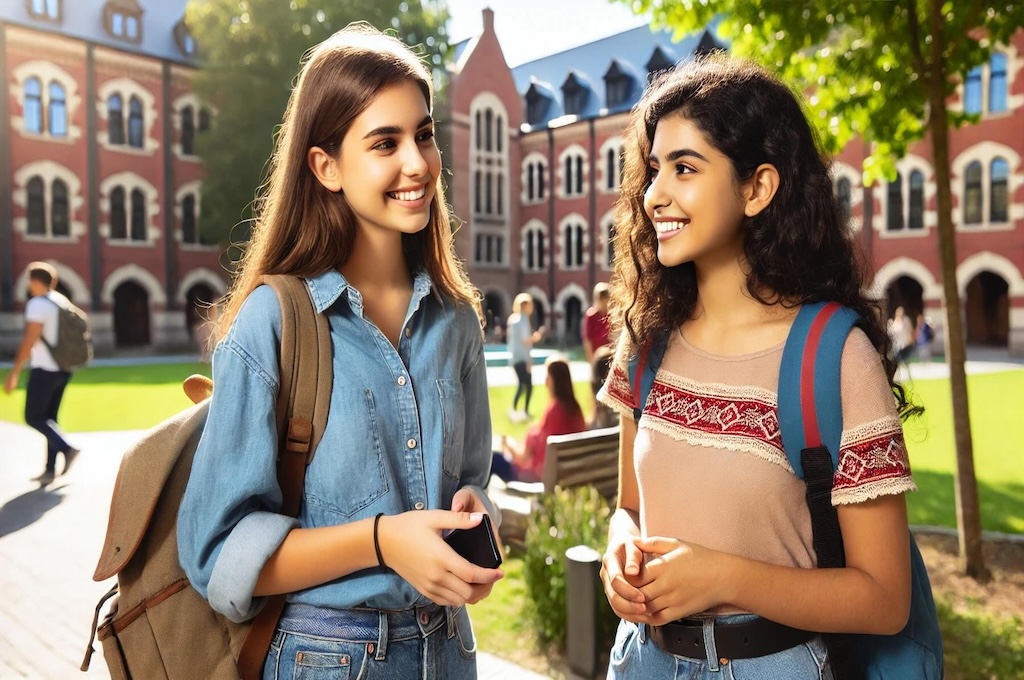Written by Dr. Paul Kelly, C.Psych. July 7, 2024
Asking questions is a powerful way to make friends.
Ask the right questions and people will like you.
Follow-up questions are best.
Learn what questions to avoid.
Table of Contents
- How Questions Can Help You Make Friends
- Asking The Right Questions
- Tips for Better Follow-Up Questions
- The Benefits of Asking The Right Questions
- Mistakes to Avoid When Asking Questions
- How to Avoid These Mistakes
- Why Don’t We Ask the Right Questions?
- Conclusion
- Personal Note and Recommended Research
How Questions Can Help You Make Friends
Who would you want as a new friend?
Someone who mostly talked about themselves.
Or someone who took an interest in you?
The answer is obvious. We like people more when they show an interest in us.
It works both ways – people will like you more – and want to be your friend – if you ask them questions.
Asking The Right Questions
When you ask follow-up questions, people will like you more. Follow-up questions show that you are really listening and that you are interested in learning more.
Here’s how to ask follow-up questions: Say something to show appreciation and then ask for more information. Let’s look at three examples:

Example 1: Olivia and Aisha
Olivia: “I just got back from a backpacking trip in Europe.”
Aisha’s follow up questions:
- “That’s amazing! What was your favorite country to visit?”
- “Wow, that sounds fun! How long were you there?”
- “Did you try any interesting foods while you were there?”

Example 2: Maria and Muhammad
Maria: “I’m really into photography.”
Muhammad’s follow-up questions:
- “That’s cool! Do you have a favorite subject to photograph?”
- “Nice! How did you get started with photography?”
- “Do you prefer taking photos indoors or outdoors?”

Example 3: Matthew and Justin
Matthew: “I just started learning to cook.”
Justin’s follow-up questions:
- “That’s great! What kind of dishes have you made so far?”
- “Cool! What’s your favorite recipe to cook?”
- “Have you taken any cooking classes, or are you learning on your own?”
Tips for Better Follow-Up Questions
- Start your follow-up questions with an expression of appreciation for what the other person just said. You might say: “Nice,” or “cool,” .
- Then, say something to prompt them to say more, to elaborate on what they first said. For example, you might say: “Why…,” “what kind….,” “where do….,” “is it…..,”
- Show them that you were listening to what they said. Let them know that you are interested in their story, what they believe, and what they care about.
These questions will help them feel that you two are on the same wavelength. That helps them to like and trust you more. They will want to spend time with you and become friends.
The Benefits of Asking The Right Questions
Building Connections
When you ask questions, you show that you’re interested in the other person. This can make them feel valued and respected. That will help you to build a strong connection. For example, if you ask someone about their hobbies, you might find common interests that can lead to a new friendship.
Increasing Likability
Dr. Karen Huang’s research shows that people who ask questions are generally more liked. When you ask questions, it shows that you care about the other person’s thoughts and feelings. This can make you more approachable and pleasant to be around.
Mistakes to Avoid When Asking Questions
There are two big mistakes to avoid when you are asking questions.
They are: Too Personal Too Fast and Not Enough Sharing.
Example 1: Too Personal Too Fast – Anna and Rachel
Here is an example of the first kind of mistake. Anna and Rachel have just met in a Psychology class. They decided to sit together and have lunch after the class.
Anna gets too personal too fast. But she catches herself and fixes her mistake. Anna learns that she has to build trust slowly and respect Rachel’s boundaries.

Anna: “So, Rachel, where are you from?”
Rachel: “I’m from Vancouver. I just moved here for school.”
Anna: “That’s cool! Vancouver is a beautiful city. Do you miss it?”
Rachel: “Yeah, a little. But I’m excited to be here and meet new people.”
Anna: “That’s great! Do you have any siblings?”
Rachel: “Yes, I have an older brother.”
Anna: “Nice. So, are your parents still together?”
Rachel looks uncomfortable and fidgets with her food.
Rachel: “Um, no. They separated a few years ago.”
Anna: “Oh, I’m sorry to hear that. Was it a messy divorce?”
Rachel looks even more uncomfortable and glances away.
Rachel: “I’d rather not talk about it. It’s kind of personal.”
Anna: “Oh, sorry! I didn’t mean to pry. Let’s talk about something else. What classes are you taking this semester?”
Rachel: “I’m taking psychology, sociology, and a writing class.”
Anna: “Nice! Psychology is fun. I think you’ll like it.”
Example 2: Not Enough Sharing or Reciprocation
Emily and Maya have just met in an English class. After class, they sit on a bench in the quad talking to get to know each other. Emily asks many questions but does not share much about herself.
Maya starts to feel that the conversation is not fair or reciprocal. She feels like she is being interrogated. She does not enjoy talking to Emily and she wants to get away.

Emily: “So, Maya, where are you from?”
Maya: “I’m from Ottawa. How about you?”
Emily: “Oh, cool. What made you choose this university?”
Maya: “I liked the campus and the programs they offer. What about you? Why did you choose it?”
Emily: “Interesting. What are you majoring in?”
Maya: “I’m majoring in biology. What about you?”
Emily: “Nice. Do you have any hobbies or things you like to do in your free time?”
Maya: “Yeah, I love painting and hiking. What do you like to do?”
Emily: “That’s cool. Have you traveled anywhere interesting recently?”
Maya: “Not really, just visiting family. Have you traveled anywhere?”
Emily: “What classes are you taking this semester?”
Maya: “I’m taking biology, chemistry, and an art class. How about you?”
Emily: “Great! Do you have any favorite spots on campus yet?”
Maya: “Um, not yet. I’m still exploring. Do you have any favorites?”
Maya starts to feel frustrated because Emily isn’t sharing anything about herself.
Maya: “So, Emily, you haven’t told me much about you. What are your hobbies?”
Emily: “Oh, I guess I like reading and watching movies.”
Maya: “That’s nice. Any favorite books or movies?”
Emily: “Yeah, I have a few.”
Maya feels the conversation is one-sided and not very fair.
Maya: “Okay, well, it was nice talking to you. I should get going.”
Emily: “Yeah, you too. See you in class!”
How to Avoid These Mistakes
Now that you know about these mistakes you can avoid them.
When you are asking questions, be sensitive to the other person’s body language. If they seem tense or distracted, maybe you are rushing things.
Take time to get to know them and keep things light at first. When you get the feeling that you have a good connection, you can start to have deeper conversations.
Also, be willing to be vulnerable and open yourself. People will like you more when you let them see that you are human and ‘not perfect.’ This is called the Beautiful Mess Effect.
Learn more about how to use the Beautiful Mess Effect to build friendships. When you share information about yourself, people will like you more and trust you more. So, there is no need to make the mistake of Not Sharing or Reciprocating.
Why Don’t We Ask the Right Questions?
Asking questions is a great way to meet new people. When you ask the right kinds of questions, people will like you. Most people do not ask enough questions. They mostly talk about themselves. Here are some reasons why we don’t ask enough questions.
Does any of these reasons apply to you? Read on. Learn how to overcome these blocks.
Reason 1: Ignorance of Benefit
Most of us don’t know how powerful it can be to ask questions. We underestimate the benefit of asking the right questions. So, we miss an opportunity to make a good impression and build new friendships.
Now that you know how powerful it can be to ask questions, can you give it a try in your life?
Reason 2: Feel Awkard or Embarrassed
Some people don’t ask questions because they are afraid that they won’t do it right. Nervousness or shyness stops them. Even if you feel nervous, take a chance and ask some questions. Use the advice in this article to guide you. You can do it.
Reason 3: Don’t Want to Be Rude
Some people are afraid that they will come across as rude or intrusive. They don’t want to be inappropriate, so they hold back from asking questions. Are you holding back for this reason? Trust yourself.
Pay attention to their body language. If you are not sure if the topic is too sensitive, it is okay to ask your new friend for feedback. They will tell you if you ask them, and they will respect you for checking.
Reason 4: Too Focused on Themselves
Many people mostly talk about themselves when they meet someone new. They are too focused on their own thoughts, feelings, and beliefs. It does not occur to them to ask about the other person – so they miss a chance to make a good impression.
If you notice yourself talking a lot about your own story, pause for a moment. Then switch the conversation to the other person. See if they become more engaged and animated. If they do, you are making a new friend.
Conclusion
Asking questions is a simple yet powerful way to make friends.
You become more likable when you show an interest in others.
Remember to ask follow-up questions.
Avoid being overly personal at first.
Share information about yourself.
If you do these things, people will want to be your friend.
Personal Note and Recommended Research
I have read these articles. They explain the research behind my recommendations about asking questions to make new friends. My therapists and I use this advice to help our clients. I know that the advice is helpful because we measure client progress at my Clinic. I hope that you can use this advice to make some new friends.
Wishing you well.
Huang, K., et al. It doesn’t hurt to ask: question-asking increases liking. (2017). Journal of Personality and Social Psychology, 113(3), 430-452. Retrieved from: https://doi.org/10.1037/pspi0000097
Sprecher, S. Listening and responsiveness in getting-acquainted processes. (2023). Current Opinion in Psychology, Volume 52. Retrieved from: https://doi.org/10.1016/j.copsyc.2023.101645.
Collins, H. When listening is spoken. (2022) 47:101402. Retrieved from: https://www.sciencedirect.com/science/article/abs/pii/S2352250X22001233?via%3Dihub
Bruk, A. et al. Beautiful mess effect : Self-other differences in evaluation of showing vulnerability. (2018) Journal of Personality and Social Psychology, Vol. 115, No. 2, 192-205. Retrieved from: https://psycnet.apa.org/doi/10.1037/pspa0000120


